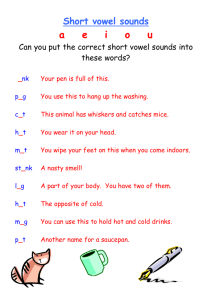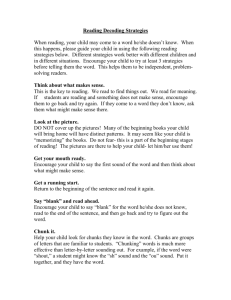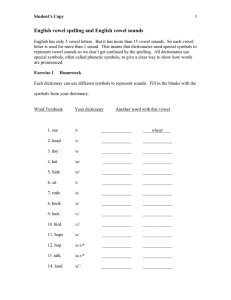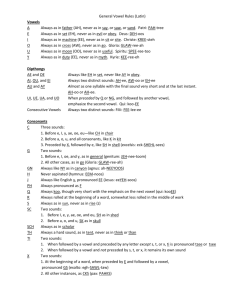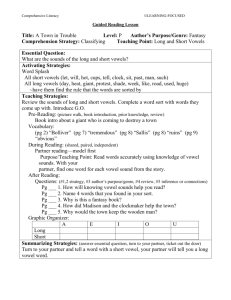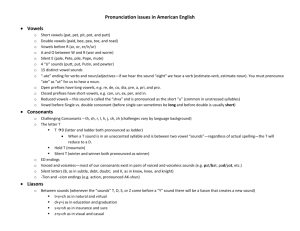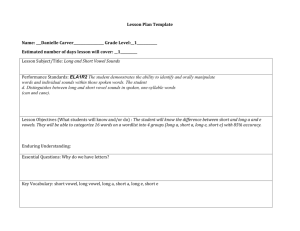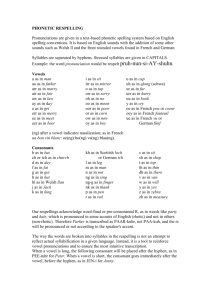English vowel spelling and English vowel sounds
advertisement
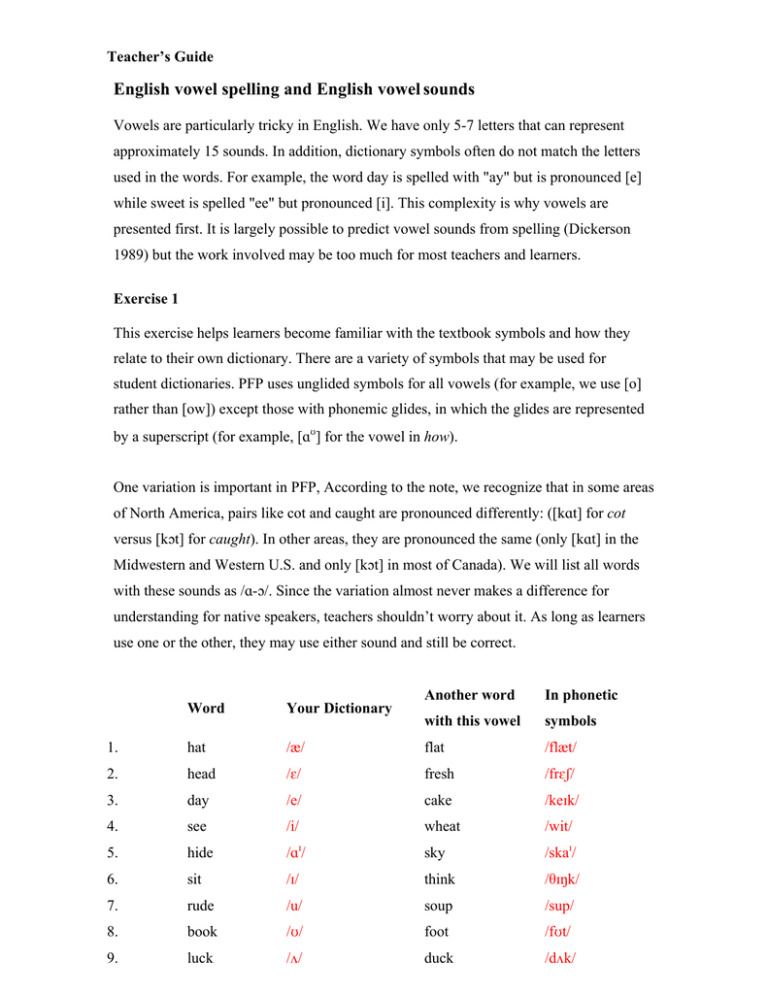
Teacher’s Guide English vowel spelling and English vowel sounds Vowels are particularly tricky in English. We have only 5-7 letters that can represent approximately 15 sounds. In addition, dictionary symbols often do not match the letters used in the words. For example, the word day is spelled with "ay" but is pronounced [e] while sweet is spelled "ee" but pronounced [i]. This complexity is why vowels are presented first. It is largely possible to predict vowel sounds from spelling (Dickerson 1989) but the work involved may be too much for most teachers and learners. Exercise 1 This exercise helps learners become familiar with the textbook symbols and how they relate to their own dictionary. There are a variety of symbols that may be used for student dictionaries. PFP uses unglided symbols for all vowels (for example, we use [o] rather than [ow]) except those with phonemic glides, in which the glides are represented by a superscript (for example, [ɑʊ] for the vowel in how). One variation is important in PFP, According to the note, we recognize that in some areas of North America, pairs like cot and caught are pronounced differently: ([kɑt] for cot versus [kɔt] for caught). In other areas, they are pronounced the same (only [kɑt] in the Midwestern and Western U.S. and only [kɔt] in most of Canada). We will list all words with these sounds as /ɑ-ɔ/. Since the variation almost never makes a difference for understanding for native speakers, teachers shouldn’t worry about it. As long as learners use one or the other, they may use either sound and still be correct. Another word In phonetic with this vowel symbols /æ/ flat /flæt/ head /ɛ/ fresh /frɛʃ/ 3. day /e/ cake /keɪk/ 4. see /i/ wheat /wit/ 5. hide /ɑɪ/ sky /skaɪ/ 6. sit /ɪ/ think /θɪŋk/ 7. rude /u/ soup /sup/ 8. book /ʊ/ foot /fʊt/ 9. luck /ʌ/ duck /dʌk/ Word Your Dictionary 1. hat 2. Teacher’s Guide 10. bird /ɜr/ shirt /ʃɜrt/ 11. hope /o/ soap /soʊp/ 12. hop /ɑ-ɔ/ clock /klɑk/ 13. talk /ɑ-ɔ/ pause /pɔz/ 14. loud /ɑʊ/ sound /saʊnd/ 15. boy /ɔɪ/ boil /bɔɪl/ Exercise 2 This exercise helps learners to hear differences between perceptually similar vowel sounds. In many cases, the words that are spelled in similar ways are actually pronounced differently. 1. wait /e/ passed /æ/ day /e/ 2. cost /ɔ/or/ɑ/ cold /oʊ/ load /oʊ/ 3. sum /ʌ/ use /u/ tool /u/ 4. side /ɑɪ/ width /ɪ/ tight /ɑɪ/ 5. feel /i/ head /ɛ/ we /i/ 6. fall /ɔ/ foul /aʊ/ how /aʊ 7. cast /æ/or/ɑ/ have /æ/ cage /eɪ/ 8. sky /ɑɪ/ fill /ɪ/ pint /ɑɪ/ 9. push /ʊ/ fool /u/ took /ʊ/ 10. know /oʊ/ talks /ɔ/ told /oʊ/ 11. loud /aʊ fowl /aʊ low /oʊ/ Words in Phonetic Transcription (Exercise 1) hat head day see hide sit rude book luck bird hope hop talk loud /hæt/ /hɛd/ /deɪ/ /si/ /haɪd/ /sɪt/ /rud/ /bʊk/ /lʌk/ /bɜrd/ /hoʊp/ /hɑp/ /tɔk/ /laʊd/ boy /bɔɪ/ Teacher’s Guide Words in Phonetic Transcription (Exercise 2) wait cost sum side feel fall cast sky push know loud /weɪt/ /kɔst/ or /kɑst/ /sʌm/ /saɪd/ /fil/ /fɔl/ /kæst/ or /kɑst/ /skaɪ/ /pʊʃ/ /noʊ/ /laʊd/ passed cold use width head foul have fill fool talks fowl /pæst/ /koʊld/ /juz/ /wɪdθ/ /hɛd/ /faʊl/ /hæv/ /fɪl/ /ful/ /tɔks/ /faʊl/ day load tool tight we how cage pint took told low /deɪ/ /loʊd/ /tul/ /taɪt/ /wi/ /haʊ/ /keɪdʒ/ /paɪnt/ /tʊk/ /toʊld/ /loʊ/
